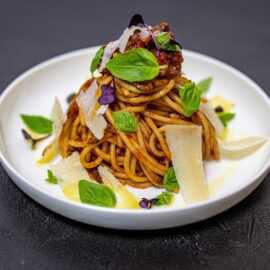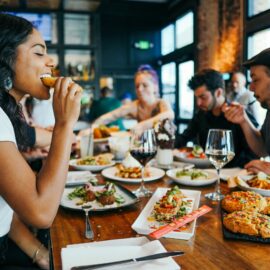The US capital has changed its tastes in the last ten years or so. New brewers, distilleries, and immigrant chefs are shaking up the culinary scene right now in Washington. It is now a thriving metropolis that is better than it has ever been.
Al Goldberg established Mess Hall in 2014 as an incubator to assist food entrepreneurs in starting their enterprises.
Many currently well-known restaurants had their start there.
According to Al, the 1990s, when Washington was a city plagued by crime, are the crucial years to look back on in order to comprehend the cultural currents at play in modern DC. This decade saw the occurrence of two significant events. A dining renaissance began in 1993 when José Andrés, a famous Spanish chef, established Jaleo in the city center. A few years later, the city’s professional ice hockey and basketball teams, which had previously played in Maryland, relocated to a stylish new facility in the Penn Quarter. Then, in 2005, the first professional baseball team to play in the city since 1971—the Washington Nationals—moved there. This confirmed the city’s lucrative sporting revival.
Al claims that all of this gave the city a fresh sense of energy and pride. At the same time, there was also something else interesting happening. Since a new presidential administration changes every four to eight years, DC has always been a transient city. However as crime decreased and a growing sense of municipal pride emerged, people begun to settle there approximately 20 years ago. People wanted to live in DC and improve the city’s quality of life.
Craft beer in Washington DC
Greg Engert, the founder and director of the Bluejacket brewery, is one of them. Greg began working at Brickskeller, a beer bar serving more than 1,200 beers from around the world in 2004. During that period, beer wasn’t mainstream.
Greg was deeply involved in the scene however. According to him, the fact that Washington has always had lax alcohol restrictions is what made Brickskeller the top beer pub in the Country at the time. For instance, buying directly from the producer rather than going via a distributor was only possible in the capital. As Greg says, this made it possible for the bar to have a large number of unusual brews, which was critical.
They had access to beer that no one else in the Country had. The liquor laws are still permissive and that’s what makes drinking in this city special.
Since the Heurich Brewing Company shut down in 1956, DC Brau was the first brewery to open in the District of Columbia in 2011. 3 Stars Brewing Company debuted the next year, and Bluejacket followed in 2013. Today, DC is home to 18 craft breweries, all of which owe something to the tiny (and long-gone) Brickskeller.
Local Distilleries
For distilleries, the situation is comparable. Local business owners successfully petitioned the city council to remove a Prohibition-era regulation that prohibited distilling in the city’s center in 2011. The outcome was the opening of the city’s first new distillery in nearly a century.
Following that, distillation flourished, much like the craft brewing movement. Especially so in Ivy City, a historically industrial neighborhood. Six of the city’s ten distilleries are located here as of right now. One Eight Distillery took its name from article one, section eight of the US Constitution; the provision that established a district to serve as the nation’s capital.
Washington was relatively late to the craft and culinary trends that struck big American cities in the US about 15 years ago. Yet people were genuinely hungry for it. It’s also the Wild West of alcohol production. Distilleries have really taken off here because of lax rules.Just down the road is Republic Restoratives which is the only female-run distillery in the area. A couple of other laws that the city approved in 2015 permitted distilleries to run and expand within the District. One permitted the installation of bars within distilleries.Republic Restoratives launched their distillery a year after this. They create bourbons in honor of people like Hillary Clinton and, vice president Kamala Harris.
A lot of the city’s recent development is down to Barack Obama, despite the fact that sports teams and legislation supportive of the alcohol industry also played a role. The city experienced a lot of excitement following Obama’s victory. All of a sudden, everyone wanted to live in Washington and help improve it.
Global cuisines
If Obama contributed to the artisanal movement in Washington, then his successor may have indirectly influenced the city’s culinary scene. A focus on immigrant cuisine has grown in popularity in the District over the past five years; maybe as a defiant reaction to Donald Trump’s anti-immigrant rhetoric and policies. Currently, a small number of organizations and eateries in the city support the promotion of immigrant cooks. One is Open Kitchen DC which plans events where immigrant chefs perform food demonstrations and educate guests about the nation and culture of their birth.
Immigrant Food is a restaurant that takes things a step further by offering a fusion of foods based on immigrant trends. It recently opened in Planet Word, the world’s first voice-activated museum, at the Franklin School. The fear for the US and its immigrant population under the Trump administration served as the impetus for the effort. Immigrants choose what food will be served. They operate the vehicles used to deliver the food and prepare the meals. They also deliver them. The food has a direct connection to immigrants.
Enrique Limardo, the chief chef at Immigrant Food and a Venezuelan native, spent weeks researching immigration to the DC area and the dishes associated with it. After studying Salvadorian and Ethiopian cookery, the food of the two major immigrant groups in Washington, he knew it was possible to combine multiple cuisines. He discovered several similarities between them and the end result is an unusual yet tasty fusion of elements from different cultures. These include dishes such as Caribbean spiced chicken drenched in a sauce with pho-inspired Vietnamese flavors.
Beyond Food
Open Kitchen and Immigrant Food are only two examples of the impact of immigrant cuisine, though. José Andrés, a Spanish chef, was selected for the Nobel Peace Prize in 2019 for his work supporting immigrants and assisting communities throughout the world through his NGO World Central Kitchen. Washington has become important in culinary and cultural trends and it has become a force for good.



